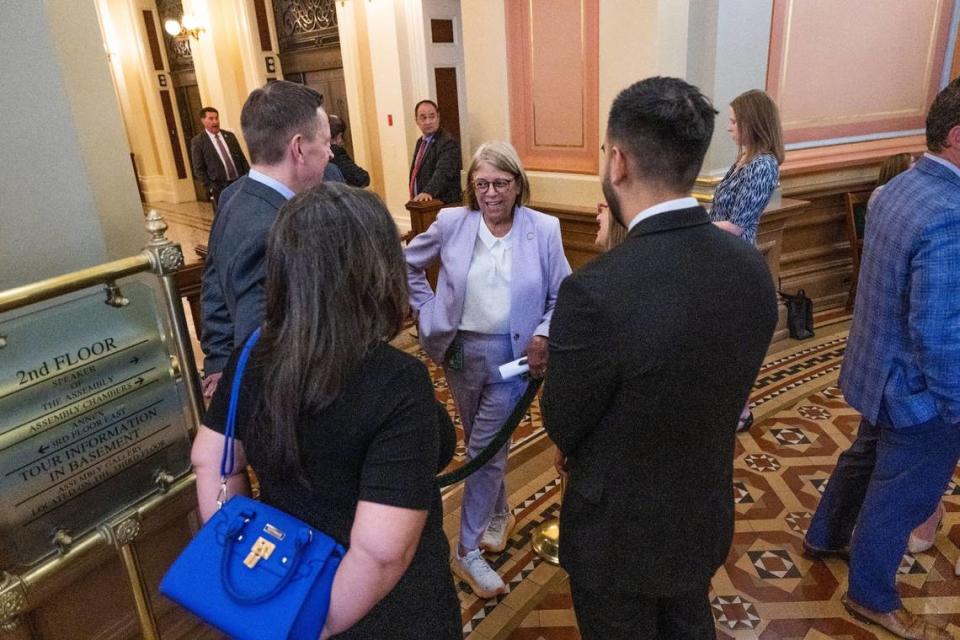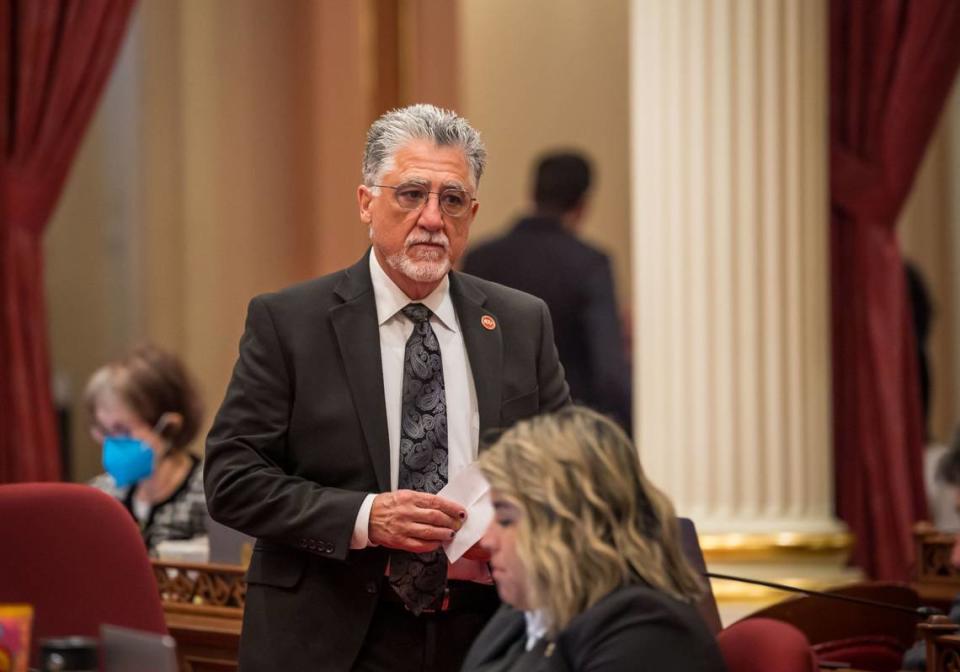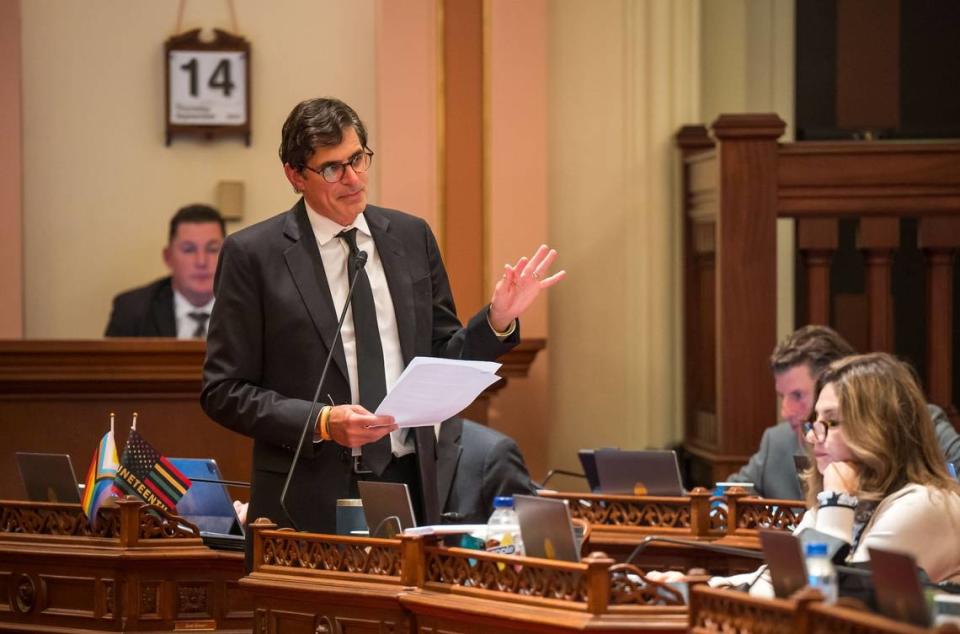California lawmakers sent hundreds of bills to Gavin Newsom. Here are 5 key takeaways
- Oops!Something went wrong.Please try again later.
After months of debate, negotiation, twisted arms, votes and re-votes, the 2023 legislative session came to a close on Thursday night. Lawmakers sent hundreds of bills to Gov. Gavin Newsom’s desk — from legalizing psychedelics to expanding paid sick leave to strengthening the state’s concealed carry gun laws.
In the coming weeks, we’ll find out which bills will become law and which ones Newsom will veto.
In the meantime, here’s five of the biggest takeaways from the end-of-session bill palooza:
Newsom had a successful session
Lawmakers largely got behind the governor’s largest priorities. They cleared the March ballot so that his $6.4 behavioral health bond will go before voters in without any competing statewide bond measures.
Newsom also had some success with gun safety.
Democrats passed a resolution Thursday calling a Constitutional Convention on the governor’s proposed 28th Amendment to raise the minimum age for purchase from 18 to 21, mandate universal background checks, establish a waiting period for all purchases and ban civilian ownership of assault rifles.
Constitutional scholars consider Newsom’s effort “essentially impossible.” Two-thirds of states must pass similar constitutional convention legislation. But it reinforces the message he has been carrying into red states, where he has waged his “Campaign for Democracy” for issues like abortion access and transgender rights, financed by his PAC.
The state is on track to strengthen its concealed carry gun laws after a bill that failed to clear the legislature last year was sent to Newsom’s desk on Tuesday. The governor has already said he will sign the bill — and gun rights groups are standing ready with a lawsuit to file the same day.
Although Newsom was not able to secure a deal to address the homeowner’s insurance crisis, he said Tuesday he’s exploring other options to prevent more companies from reducing coverage.
Passage does not guarantee a signature
Some high-profile bills could be at risk of a veto.
These include legislation to give striking workers unemployment benefits and restrict the rollout of self-driving trucks.
AB 316, authored by Assemblywoman Cecilia Aguiar-Curry, D-Winters, would require a human operator behind the wheel of any autonomous truck driving on California roadways. The bipartisan bill sailed through both chambers with overwhelming support, including a 36-2 vote in the Senate on Monday.

However, the Newsom administration has been frank about where it stands on the issue — with the autonomous vehicle industry.
While driverless cars have been cruising California roadways for years, the state currently bars autonomous vehicles weighing more than 10,000 pounds, like trucks. The legislation circumvents a regulatory process underway at the California Department of Motor Vehicles to begin considering unraveling the state’s prohibition.
Dee Dee Myers, the administration’s top business official, wrote to lawmakers last month that AB 316 hampers California’s competitiveness and undermines existing oversight.
“Our state is on the cusp of a new era and cannot risk stifling innovation at this critical juncture,” she wrote.
Bills that failed repeatedly finally passed
A handful of bills killed by lawmakers in past sessions had a reversal of fortune this year.
A hard-fought effort more than 20 years in the making that allows legislative staffers to unionize made it to the governor’s desk. This was at least the fifth time since 2000 that a staff unionization bill was introduced. If signed by the governor, it will take effect in 2026.
A bill to place a state excise tax on guns and ammunition made it to the governor’s desk after years of previous failed attempts dating back to 2013.
Sen. Anthony Portantino, D-Burbank, did not let last year’s narrow defeat stop him from trying to shore up the state’s concealed carry rules again. Portantino came back with a similar bill this year but dropped an urgency clause to lower the number of votes required for passage threshold. The bill secured the necessary support and is expected to be signed by the governor in the coming weeks.

Big Tech scored some major wins
This year shaped up to be a big one for Big Tech, which faced a number of measures on the agenda intended to curb its power.
So how did those bills fare? In a word: Poorly.
A bill to ban TikTok and other apps owned by companies based in countries with potentially hostile regimes, like China, on state-issued smartphones was amended and then pushed off until 2024, after Gov. Gavin Newsom signed an executive order for the state to study artificial intelligence.
Also shunted off to the 2024 calendar was Assembly Bill 886 from Assemblywoman Buffy Wicks, D-Oakland that would have required social media platforms like Meta and Google to pay news organizations for content that they use. That bill faced intense pushback from Meta, owner of Facebook and Instagram, which threatened to pull news from its platforms outright if the bill became law.
One major tech bill — Senate Bill 680 by Sen. Nancy Skinner, D-Berkeley — was killed outright, one of many measures quashed by the Legislature’s powerful appropriations committees. SB 680, like SB 287 before it, would have held social media platforms accountable for children who become addicted to their platforms, as well as those who suffer an eating disorder or inflict harm on themselves or others as a result of accessing social media.
But there were some bright spots for lawmakers looking to push back against Big Tech.
Senate Bill 362, by Sen. Josh Becker, D-San Mateo, strengthens the California Consumer Privacy Act by allowing consumers to request that their data be deleted from data broker websites. Despite heavy tech industry lobbying against the measure, it passed an Assembly floor vote, 52-14 on Wednesday and was likely to pass on concurrence in the Senate on Thursday. Assembly Bill 1394, also by Wicks, which is intended to curb child sex trafficking and exploitation on the internet, passed out of the Legislature earlier this week and is awaiting a signature, or veto, from Newsom.

A quieter year for climate legislation
This session marked a relatively quiet year for environmental policy, a clear contrast to 2022 when Gov. Gavin Newsom introduced and signed a flurry of bills meant to slash carbon emissions.
Still, some consequential environmental bills stood out.
Lawmakers advanced two first-of-their-kind measures to allow Californians to assess the carbon footprint of the state’s largest corporations and gain insight into how those companies plan to handle their climate-related risks.
Assembly Bill 1373 represents a deal between lawmakers and the governor to advance California’s burgeoning offshore wind industry through central procurement.
Fierce opposition from agriculture and business watered down several strong water rights measures, but Senate Bill 389 spells out the state’s powers to investigate long-standing claims to water.

